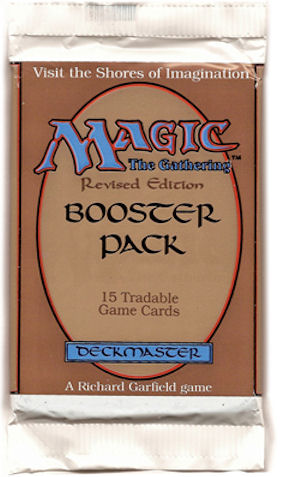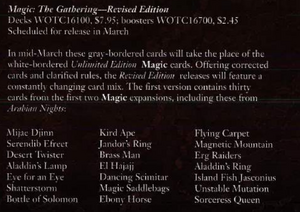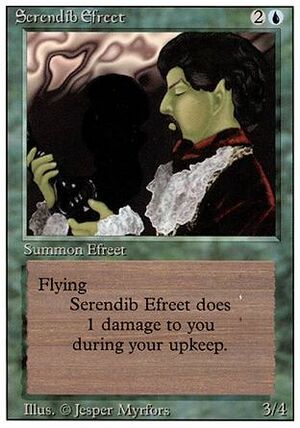Revised Edition
| Revised Edition | |||||
|---|---|---|---|---|---|
| Set Information | |||||
| Set symbol | |||||
| Design |
Richard Garfield with contributions from Charlie Cateeno Skaff Elias Don Felice Tom Fontaine Jim Lin Joel Mick Chris Page Dave Pettey Barry "Bit" Reich Bill Rose Elliott Segal | ||||
| Development | Same as design | ||||
| Art direction | Jesper Myrfors | ||||
| Release date | April 11, 1994 | ||||
| Plane | Multiversal | ||||
| Set size |
306 cards (75 commons, 95 uncommons, 121 rares, 15 basic lands) | ||||
| Expansion code | 3ED[1] | ||||
| Languages | English, French, German, Italian | ||||
| Core sets | |||||
| |||||
| Magic: The Gathering Chronology | |||||
| |||||
| Scryfall Statistics | |||||
|
296 cards | |||||
The Revised Edition, or Revised as it is commonly called, is the third edition of the Magic core set. It was released on April 11, 1994.[2]

A second print run of this edition known as "Summer Magic" or "Edgar" was also printed, but cancelled, with most of the run never distributed or recalled and destroyed.
Set details

Wizards of the Coast made multiple attempts to print an improved version of the core set before finally getting Revised out the door.[3] Revised consists of 306 cards - 15 basic lands, 75 commons, 95 uncommons, and 121 rares. Revised was the first core set to "rotate" some cards out, removing several cards due to power level or complexity, and replacing them with other cards from previously printed limited expansions. The expansions available at the time were Arabian Nights and Antiquities.[4]
Previous printings of the Core set had basic lands on every print sheet in an attempt to obfuscate the rarity of each slot in a pack. The Revised update removed basic lands from the rare sheet but kept them on both the uncommon and common sheets. The chance of getting a basic land instead of a non-land card is approximately 21.5% for uncommons and 38.02% for commons.
As with all core sets before Sixth Edition, Revised cards have no set symbol on the cards and no indicator of rarity. The set symbol was created retroactively, presumably for use in Gatherer.
An early advertisement in The Duelist #1 stated that Revised cards would be gray bordered, but they ultimately remained white bordered like the Unlimited Edition. A production oversight resulted in the "bevel" that framed the cards being cropped off. Also, well-used printing films gave the cards faded colors. Many players complained about the lack of quality of the set, both in terms of card power and the look.
Marketing
Cards were available from mid-April 1994 through mid-April 1995. The print run is estimated at 150 to 250 million cards.[5] The cards were sold in 60-card starter decks and 15-card boosters. Starter decks included a rulebook with Shivan Dragon on the cover and a checklist on the back and last pages. Revised was the first set that was supplemented with a special gift box. The Revised Gift Box (released on November 15, 1994) included two starter decks, 30 glass counters, a flannel bag for storing the counters, an illustrated rulebook, and a card collectors' checklist.
Revised is the first set published in languages other than English: French, German, and Italian. All had a black bordered and a white bordered print run.
Rules
As the players' knowledge of the game and its potential developed, so did the knowledge of the designers and developers. Their collaboration led to the first Magic: The Gathering Pocket Player's Guide, which solidified the rules of Magic. However, for later editions, the rules would change many times over.
Revised introduced the first tap symbol: A slightly tilted 'T' inside a gray circle. The artifact types Mono and Poly became obsolete, and were removed from cards that had them. Tap symbols were added to mono artifacts where they were previously implied by the type. The set also changed references to mana color in card texts to mana symbols.[6]
Cycles
Revised has 5 cycles. All are reprinted from Limited Edition except for the "Enemy color hate" card Magnetic Mountain, which was first printed in Arabian Nights. Compared to previous core sets, the Moxes were not reprinted, nor were Word of Command and Ancestral Recall, breaking the artwork-inspired cycle and Boon cycle.
Double cycles
| Cycle name | ||||||||||
|---|---|---|---|---|---|---|---|---|---|---|
| Dual lands | Tundra | Underground Sea | Badlands | Taiga | Savannah | Scrubland | Volcanic Island | Bayou | Plateau | Tropical Island |
| Rare nonbasic lands that each produce two colors of mana. | ||||||||||
Vertical cycle
| Cycle name | Common | Uncommon | Rare |
|---|---|---|---|
| Red three-drop humanoids | Gray Ogre | Uthden Troll | Sedge Troll |
| Each of these 2/2 red creatures has a mana cost of | |||
Pairs
Revised edition has 23 pairs, all of which were reprinted from the previous core sets starting with Alpha. The only Limited Edition pair card no longer present in this set is Timetwister, leaving Wheel of Fortune as a standalone card in this set.
| Pairs | Description | |
|---|---|---|
| White Knight ( |
Black Knight ( |
Uncommon knights with a mana cost of MM, power/toughness of 2/2, first strike, and protection from the other's color. |
| Holy Strength ( |
Unholy Strength ( |
Common Auras with enchant creature that gives a mirrored bonus to the enchanted creature's power/toughness. |
| Crusade ( |
Bad Moon ( |
Rare enchantments with a mana value of 2 and an effect to give all creatures of its color +1/+1. |
| Serra Angel ( |
Sengir Vampire ( |
Uncommon 4/4 flying creatures with a mana cost of |
| Blue Elemental Blast ( |
Red Elemental Blast ( |
Common instants (formerly interrupts) with a mana cost of M and with a modal ability to either destroy a permanent of the other's color or counter a spell of the other's color. |
| Air Elemental ( |
Earth Elemental ( |
Uncommon Elementals with a mana cost of |
| Water Elemental ( |
Fire Elemental ( |
Uncommon Elementals with a mana cost of |
| Lord of Atlantis ( |
Goblin King ( |
Rare lords that give +1/+1 and landwalk of its corresponding basic land type to its creature type. |
| Merfolk of the Pearl Trident ( |
Mons's Goblin Raiders ( |
1/1 common vanilla creatures with creature types that are affected by their respective lords (Goblin King and Lord of Atlantis). |
| Phantom Monster ( |
Roc of Kher Ridges ( |
3/3 creatures with flying and a mana cost of |
| Wall of Water ( |
Wall of Fire ( |
Uncommon 0/5 walls illustrated by Richard Thomas with a silhouetted figure behind a wall, mana cost |
| Wall of Bone ( |
Wall of Brambles ( |
Uncommon walls with regeneration and a mana cost of |
| Deathgrip ( |
Lifeforce ( |
Uncommon enchantments with an activated ability to counter a spell of the other's color for MM. |
| Orcish Oriflamme ( |
Castle ( |
Uncommon enchantments that conditionally affect its owner's creatures' power or toughness. Both cost |
| Wanderlust ( |
Feedback ( |
Uncommon Auras that deal 1 damage to the controller of the enchanted permanent during each of their upkeeps. |
| Braingeyser ( |
Mind Twist ( |
Rare sorceries that cause target player to draw or discard cards. |
| Earthquake ( |
Hurricane ( |
Sorceries that have a mana cost of |
| Flashfires ( |
Tsunami ( |
Uncommon sorceries that have a mana cost of |
| Timber Wolves ( |
Benalish Hero ( |
1/1 creatures with banding and a mana cost of M. |
| Manabarbs ( |
Power Surge ( |
Rare red enchantments that deal damage to a player based on the number of lands they do or don't tap. |
| Ankh of Mishra ( |
Dingus Egg ( |
Rare artifacts that deal damage when a land enters or leaves the battlefield. |
| Kormus Bell ( |
Living Lands ( |
Rare permanents which cost 4 mana and turn lands of a specific subtype into 1/1 creatures. |
| Winter Orb ( |
Smoke ( |
Rare permanents which cost 2 mana and only allow players to untap one of a specific type of permanent each turn. |
"Summer Magic"/"Edgar"
When the Revised Edition was in production in 1994, several problems with the set became apparent. The colors were washed out, the picture for Serendib Efreet was wrong, and Wizards wanted to remove Satanic images on some of the cards. The solution was to print a fixed version of the Revised Edition, code-named "Edgar",[7] which has since come to be known as Summer Magic because it was printed in the summer of 1994. The cards were distributed in regular Revised Edition boosters – no Summer edition starters were produced. Summer Magic cards can best be recognized by their prominent 1994 copyright date (a feature missing in Revised), as well as their richer colors..
Despite its intended function as a fixed Revised Edition, there were many problems with this printing. On some cards, the colors were too dark. Serendib Efreet had its artwork corrected, but the artist's credit was not. The artist name for Plateau was not corrected. The pentagram was removed from the head of Demonic Tutor, but not from the chest. Hurricane was printed with a blue border, and is considered the most iconic Summer Magic printing.[8] Because of all these flaws, the entire print run was recalled for destruction which led to the great Revised Edition shortage of 1994. However, according to unconfirmed reports from WotC employees, about 40 booster boxes of "Edgar" survived and were shipped to locations in the U.S. and the UK, with probable locations include Tennessee, Texas, and Ireland.[9]
Misprints


- Ivory Tower — Margaret Organ-Kean's name is misspelled "Margaret Organ-Keen".
- Onulet — Incorrect artist is listed; it should be Anson Maddocks, not Kerstin Kaman.
- Plateau — Incorrect artist is listed, it should be Cornelius Brudi, not Drew Tucker.[10]
- Nevinyrral's Disk — With the change from Poly, Mono and Continuous to just Artifact, the adding of the tap symbol was overlooked for this card in Revised Edition.
- Serendib Efreet — Printed with a green background and the picture of the Ifh-Bíff Efreet. It still has the proper casting cost and text, however.
- The French version (printed with the correct background and picture) has flavor text that is missing on the English card.
Core set changes
References
- ↑ Wizards of the Coast (August 02, 2004). "Ask Wizards - August, 2004". magicthegathering.com. Wizards of the Coast. Archived from the original on 2020-11-12.
- ↑ Wizards of the Coast. (1994) The Duelist Supplement. Wizards of the Coast
- ↑ David Howell: The Regathering
- ↑ Magic Arcana (October 31, 2002). ""Revising" the base set". magicthegathering.com. Wizards of the Coast. Archived from the original on 2020-08-12.
- ↑ Ryan William Rooks (2014). A Collector's History of Magic the Gathering, CreateSpace. ISBN-10 1-49222-940-7.
- ↑ Mark Rosewater (October 04, 2004). "Change For the Better". magicthegathering.com. Wizards of the Coast.
- ↑ Michael G. Ryan (June 01, 2009). "A Magic History of Time". magicthegathering.com. Wizards of the Coast. Archived from the original on 2021-04-14.
- ↑ Magic: The Gathering - Summer Magic (Edgar)
- ↑ Magic Arcana (June 24, 2003). "Blue Hurricane". magicthegathering.com. Wizards of the Coast. Archived from the original on 2020-11-12.
- ↑ Magic Arcana (February 20, 2002). "Plateau(s)". magicthegathering.com. Wizards of the Coast. Archived from the original on 2020-09-22.
